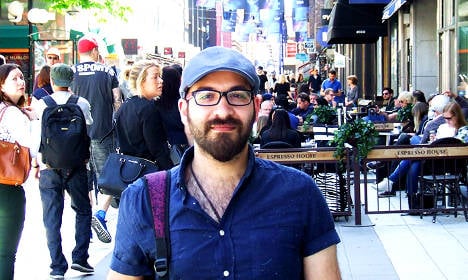When Housam, 29, was arrested for the third time in September 2012, his life changed forever. His dissident activities had landed him on a regime blacklist and he was growing accustomed to darting about Damascus unseen, but nothing had prepared him for the cruelty of this final arrest.
September 1st 2012: Horror on the road from Damascus to Rankus
Housam and two friends were driving to Rankus, a popular summer resort 45 kilometres from Damascus, to document an opposition demonstration when they were pulled over by fifteen gun-toting members of the Syrian security forces.
The friends feared the worst, not least because they had a camera hidden in the car’s upholstery. And the gunmen didn’t for a second believe their claim that they were just going to a party.
“They started to tear apart the car’s furnishings,” he tells The Local. “And they found the camera.”
For the next eleven hours Housam and his friends were mercilessly beaten by the security forces, he says.
One of the ringleaders took him aside and ordered him to confess that the trio had planned to take part in illegal anti-government activities. When he refused, his antagonist became more sadistic.
“He kept trampling all over me and hitting my entire body and face, while repeatedly saying, ‘I will castrate you’, until the blood poured from the cuts on my eyes.”
“He looked at my face and said: ‘Wait for me; I am going to find a proper tool to tie up your balls – I will castrate you.”
Housam weighed up his options and vowed to kill himself before his torturer returned. But he scarcely had strength enough to move after a day in which the soldiers had taken turns to kick and beat him.
The abyss loomed, but suddenly his luck changed.
“When the despicable monster was walking back towards me, one of his comrades arbitrarily popped up, grabbed his arm and took him away.”
Soon Housam was led back to his friends, and before long the militants agreed to let them go.
The battered friends stumbled back to their car in a panic. One of them was crying. They all feared they would be shot in the back as they walked away, and Housam could think only of his mother and girlfriend and whether he would see them again.
“It felt like a death march,” he recalls. “When we got into the car my friend said: ‘It’s done, we’re going home’. Then I lost consciousness.”

Photo: Private
December 29th 2012: The escape
Housam spent the two months after his torture sequestered in a friend’s apartment. He didn’t want his mother to see his wounds, and also he was worried the security forces would track him down if he went home. The scars stayed on his body for four months.
“I cried with humiliation. Indescribable emotions gripped my heart and turned my life into a nightmare.”
He slept with a knife under his pillow until the realization grew: he had to leave Syria.
“I couldn’t go on any more, so I headed for Lebanon.”
Like countless others fleeing the war, his travels took him to Egypt and then Turkey. Neither place felt safe.
He wanted to leave for Western Europe, but where could he go? A friend recommended he apply for shelter through an independent group called ICORN, the International Cities of Refuge Network, which tries to find homes for writers on the run.
Sweden was on Housam’s wish-list: An Iraqi intellectual living in Sweden, Jasem Mohammed, had already urged him to have his poetry translated.
Soon some poems were published in Swedish. He began corresponding with several Swedes, who worried about his safety in Turkey, where terrorist attacks were growing more commonplace.
To his great delight and relief, Linköping accepted his application and made him a writer-in-residence in the city of 100,000 people in eastern Sweden.
February 25th 2016: Welcome to Sweden
“When I landed on Swedish soil, I kept sneezing for five minutes – so much oxygen, you can actually breathe the clear air.”
His experience of Sweden has been overwhelmingly positive. He attributes this to the welcome he has received from Linköping in general, and one woman in particular – Annika Ekström Stockman, a city librarian who co-ordinates the writer’s residency between Linköping and ICORN.
“It feels like I am living with my family, especially when it comes to Annika and her family – I just feel really good.”
Housam is impressed by how curious Swedes are about the war in Syria, but recognizes that this is also the main point of differentiation between him and his hosts.
“They do not know what war is, what it means to live a war. What does it mean to walk the streets and see dead people on the pavement? What does it mean to buy food from a market when a barrel bomb rips tens of people to shreds?”
—
Housam al-Mosilli is a poet, English-Arabic translator, editor and researcher.
A lot of his poetry in recent years has been influenced by the war in Syria and its impact on the populace. In this excerpt he writes about how totalitarian rule has twisted people’s lives. Having your legs in the air is the new normal, and asking your university professor to explain the mechanisms of dictatorship can land you in jail.
Featureless alien
It’s natural now to see people walking upside down
You start to wonder when you see them walking on the ground
Unlike the rest with their legs way up in the air
As is required at this critical stage!
Why not? You’re in a country where you can be expelled from university
And locked up in the intelligence service’s dungeons
For putting up your hand in a sociology lecture about
The symptoms of dictatorship
And asking your professor, laden with Russian diplomas:
“Could you possibly give us a local example?”


 Please whitelist us to continue reading.
Please whitelist us to continue reading.